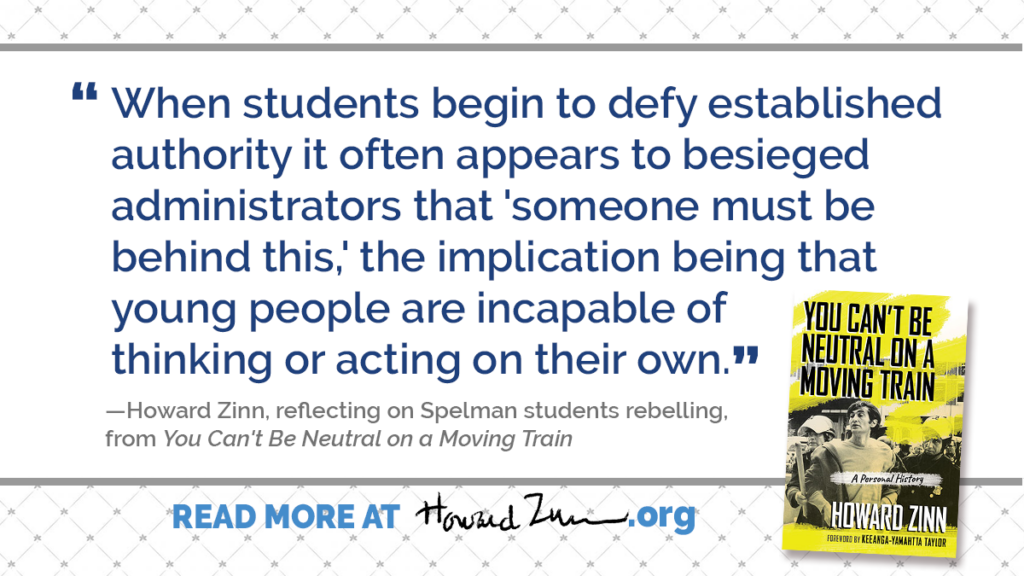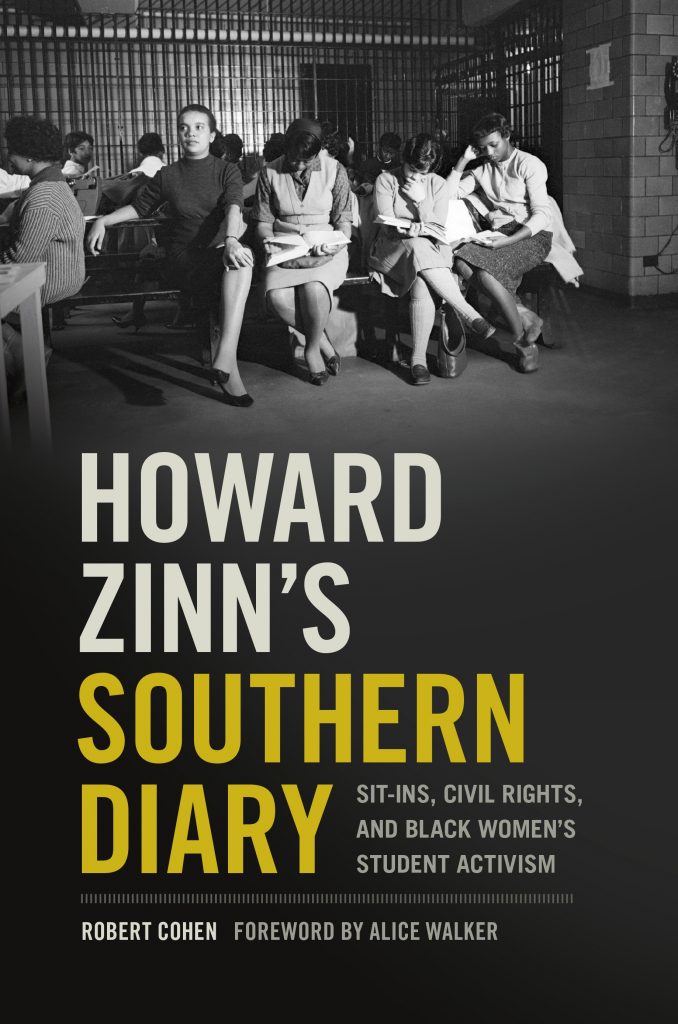
By Howard Zinn
From chapter three, “A President Is Like a Gardener,” of Howard Zinn’s autobiography You Can’t Be Neutral on a Moving Train
When the sit-in movement erupted in Atlanta in the spring of 1960, I wrote an article for The Nation about the participation of Spelman students and noted that the traditional Spelman emphasis on turning out “young ladies” was being challenged, that the new-type Spelman student was to be found on the picket line, or in jail. I learned that President Manley resented the article for its criticism of the college as it was.
In the spring of 1962, students were stimulated by the visit of Spelman alumna Marian Wright, then at Yale Law School, who spoke to them about young people becoming a force for social change. Shortly after her departure, a group of students addressed a petition to the Spelman administration. They respectfully acknowledged Spelman’s “productive past,” but said the college was “not preparing today’s woman to assume the responsibilities of today’s rapidly changing world. . . . The acquisition of knowledge is impaired by the conspicuous absence of an atmosphere conducive to intellectual curiosity and the pursuit of excellence.” They asked for “first steps” to create a new atmosphere, a liberalizing of the rules, modernization of the curriculum, improvement of library facilities.
A meeting was called to publicize the petition and there was a huge turnout. More than three hundred young women, over half the student body, signed the petition. An honors student named Lana Taylor chaired the meeting.
President Manley responded angrily. He called in student leaders, including Lana Taylor, and berated them for circulating the petition, saying they should have utilized “regular channels.” He said that if students didn’t like the situation at Spelman they could leave. He demanded that the student newspaper, which was planning to include the petition in its forthcoming issue, not print it. The editor later said it was “like a decree . . . . I didn’t feel I had any choice but to obey.”
That summer of 1962, Lana Taylor received a letter from the college informing her that her request for a scholarship had been denied on the ground of “poor citizenship.” (In May she had been elected president of the senior class.)
In the spring of 1963 matters came to a head. The Social Science Club decided to call a meeting to air some of the issues of campus life. I was the club’s advisor, but I did not initiate the idea. The topic for the evening was “On Liberty at Spelman,” and faculty, administration, and students were all invited. A dozen faculty came. Some administrators were there, but Dr. Manley said he had another engagement. The room, which usually held about thirty or forty students, was packed with over two hundred. The meeting was chaired by Dorcas Boit, a student from Kenya.
Student after student rose to denounce the administration for indignities they had experienced — surveillance, paternalism, authoritarianism — and to express their fears. “We are afraid that if we sign anything we won’t graduate. You’re afraid to say something. You’re afraid somebody might call you in.” Students told of not being allowed to leave their rooms because they did not attend a concert being given on campus.
Marie Thomas, who had won Spelman’s award for artistic achievement and was one of five theater people suspended for a semester because they had attended a cast party “after hours” (she went on to a successful career on the New York stage), sent a letter to be read to the meeting. It spoke passionately against “our traditional, antiquated, medieval, and aged standards, rules and regulations. . . .What do they mean to a modern girl growing normally and learning in our modern world today? Times have indeed changed. God give us the strength, knowledge, and understanding to change with them.” The students greeted her letter with tremendous applause.
At a faculty meeting chaired by President Manley, I proposed that he and my colleagues listen to a tape of that student meeting to get a sense of their grievances. Manley refused. It was becoming clear that he saw me as an instigator rather than simply a supporter of the protests. When students begin to defy established authority it often appears to besieged administrators that “someone must be behind this,” the implication being that young people are incapable of thinking or acting on their own.
Learn more
Read the full chapter in You Can’t Be Neutral on a Moving Train.
Learn more about Howard Zinn’s time at Spelman in Howard Zinn’s Southern Diary: Sit-ins, Civil Rights, and Black Women’s Student Activism.
Category:





